|
Canola Quick Bytes
A supplement to U.S. Canola Digest
Capitol Hill
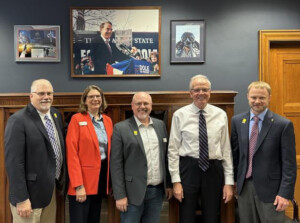 On March 15, Senator Jerry Moran (R-KS) met with members of the U.S. Canola Association (USCA) about their priorities for the upcoming farm bill that will benefit canola growers in Kansas. “Michael Stamm, a canola breeder and researcher at Kansas State University talked about the importance of research, especially research geared towards winter canola,” wrote Sen. Moran in his March 20 Kansas Common Sense e-newsletter. “We discussed the growing demand for biofuels and the role canola plays in filling that demand. We also spoke about the recommissioning of the crush plant in Goodland which will create new jobs and provide new opportunities for canola growers in the area.” On March 15, Senator Jerry Moran (R-KS) met with members of the U.S. Canola Association (USCA) about their priorities for the upcoming farm bill that will benefit canola growers in Kansas. “Michael Stamm, a canola breeder and researcher at Kansas State University talked about the importance of research, especially research geared towards winter canola,” wrote Sen. Moran in his March 20 Kansas Common Sense e-newsletter. “We discussed the growing demand for biofuels and the role canola plays in filling that demand. We also spoke about the recommissioning of the crush plant in Goodland which will create new jobs and provide new opportunities for canola growers in the area.”
In advance of budget season on Capitol Hill, the USCA and regional canola associations joined other agricultural groups in a letter to House and Senate budget committees in support of sufficient resources for the House and Senate agriculture committees to craft the next farm bill. All told, over 400 national, regional and state groups signed the letter.
The USCA was part of a diverse group of stakeholders that urged Congress to prioritize investments in food and agricultural research, facilities, extension and education in the 2023 Farm Bill. This investment is needed to keep pace with global competitors, to modernize facilities, and to ensure nutrition security and a sustainable food system.
 The USCA submitted to Congressional offices its annual federal appropriations requests for the Supplemental & Alternative Crops program and Sclerotinia research initiative, which directly benefit canola. In addition, the USCA supported joint efforts to advocate for adequate resources for the Environmental Protection Agency’s Office of Pesticide Programs to carry out pesticide registration and Endangered Species Act-related activities. The USCA submitted to Congressional offices its annual federal appropriations requests for the Supplemental & Alternative Crops program and Sclerotinia research initiative, which directly benefit canola. In addition, the USCA supported joint efforts to advocate for adequate resources for the Environmental Protection Agency’s Office of Pesticide Programs to carry out pesticide registration and Endangered Species Act-related activities.
Groups led by the Association of Public and Land-grant Universities (APLU) are pushing for funding for research facilities. A 2021 report from Gordian determined 70% of research, education and Cooperative Extension System facilities at U.S. public colleges of agriculture are at the end of their useful life. It assessed a need of $11.5 billion for deferred maintenance for university agricultural research, education and extension facilities. The report also acknowledged that $550 million annually is needed just to keep up with facility challenges.
 The USCA signed a letter to President Joe Biden in response to Mexico’s treatment of agricultural biotechnology, emphasizing that the U.S.-Mexico relationship must be underpinned by science-based, functioning laws and regulatory bodies. Despite multiple engagements by the U.S. government to resolve this situation through negotiations, Mexico recently released a new decree that wrongly calls into question the safety of biotech products for human consumption by creating a non-science-based distinction of corn used for food versus feed and industrial uses. The USCA signed a letter to President Joe Biden in response to Mexico’s treatment of agricultural biotechnology, emphasizing that the U.S.-Mexico relationship must be underpinned by science-based, functioning laws and regulatory bodies. Despite multiple engagements by the U.S. government to resolve this situation through negotiations, Mexico recently released a new decree that wrongly calls into question the safety of biotech products for human consumption by creating a non-science-based distinction of corn used for food versus feed and industrial uses.
The U.S. Department of Agriculture (USDA) is allowing producers to submit 2022 Census of Agriculture forms until April 30, 2023 via agcounts.usda.gov or by mail. It’s vital that as many producers as possible fill out the form because their responses inform policy decisions, research, education, and more.
Agronomy
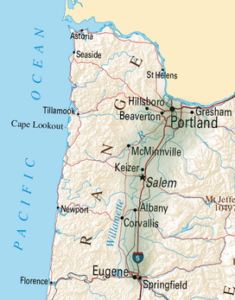 Canola planting restrictions in Willamette Valley, Ore. are under debate in the state legislature as they are set to expire this June and a contentious bill supported by vegetable seed growers aims to make restrictions permanent. Currently, regional farmers are limited to planting 500 acres of canola, which must be at least three miles away from other Brassica crops. A public hearing was held in March for Senate Bill 789. Sixteen people testified and 25 submitted comments, including USCA President Andrew Moore. Proponents of the bill cite a 2023 report by Highland Economics, commissioned by the Organic Seed Alliance and Oregon Organic Coalition, which claims canola cross-pollination is a risk to other Brassica crops. But opponents, including Oregon State Legislature Representative Anna Scharf (R-District 23), point to a 2017 Oregon State University study which found that local canola can safely expand beyond current limits. Canola planting restrictions in Willamette Valley, Ore. are under debate in the state legislature as they are set to expire this June and a contentious bill supported by vegetable seed growers aims to make restrictions permanent. Currently, regional farmers are limited to planting 500 acres of canola, which must be at least three miles away from other Brassica crops. A public hearing was held in March for Senate Bill 789. Sixteen people testified and 25 submitted comments, including USCA President Andrew Moore. Proponents of the bill cite a 2023 report by Highland Economics, commissioned by the Organic Seed Alliance and Oregon Organic Coalition, which claims canola cross-pollination is a risk to other Brassica crops. But opponents, including Oregon State Legislature Representative Anna Scharf (R-District 23), point to a 2017 Oregon State University study which found that local canola can safely expand beyond current limits.
 What do we know about canola flower midge? Dr. Meghan Vankosky, entomologist with Agriculture and Agri-food Canada says in RealAgriculture that the pest was discovered in 2016 and remains a challenge to manage. “We do know that they prevent canola plant development and they lay eggs in flowers that are at near opening, creating bottled/galled flowers and preventing those specific pods from developing.” Vankosky is working on two projects to better understand canola flower midge and find solutions for farmers. What do we know about canola flower midge? Dr. Meghan Vankosky, entomologist with Agriculture and Agri-food Canada says in RealAgriculture that the pest was discovered in 2016 and remains a challenge to manage. “We do know that they prevent canola plant development and they lay eggs in flowers that are at near opening, creating bottled/galled flowers and preventing those specific pods from developing.” Vankosky is working on two projects to better understand canola flower midge and find solutions for farmers.
Nutrition
Maintaining a healthy diet is important for our physical and mental well-being, and contrary to popular belief, eating healthfully is affordable thanks to ingredients like canola oil, noted USCA Director of Communications Angela Dansby in the USCA Blog. To help people eat healthfully and affordably, she pointed to tips and resources from the Academy of Nutrition and Dietetics (AND) for National Nutrition Month® in March, which marked the campaign’s 50th anniversary.

How healthy is canola oil? Very, according to scientific evidence! The Canola Council of Canada provides links to nutritional research published in peer-reviewed scientific journals since canola was developed. Among several benefits, these studies show that canola oil-based diets can reduce total and LDL cholesterol in healthy people and those with high cholesterol, reducing the risk of heart disease, notes the USCA.
Other Country News
The Canadian Canola Growers Association was the busiest lobbying group in Canada in 2022, reports the Manitoba Cooperator, and the Canola Council of Canada also made the top 10. Reasons why were sustainability, biofuels and Bill C-234, which will determine if fuels for grain drying and barn heating are exempt from the price on carbon. The groups expanded their outreach to health and economic domestic agencies and the U.S. Environmental Protection Agency to make space for Canadian canola in the growing renewable fuels market. In addition, the groups tried to expand market access in Vietnam and Thailand.
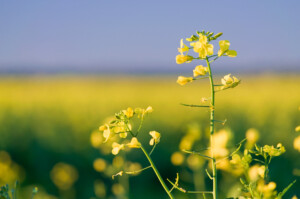 A collaboration between Alberta Canola, SaskCanola, the Manitoba Canola Growers Association and Western Grains Research Foundation will enable more than $1.7 million in funding for five new projects under the Canola Agronomic Research Program (CARP) in 2023. The projects will address developing and evaluating disease resistance, abiotic stress resilience, and integrated pest management. The CARP is administered by the Canola Council of Canada and findings can be found on its Canola Research Hub and Canola Encyclopedia. A collaboration between Alberta Canola, SaskCanola, the Manitoba Canola Growers Association and Western Grains Research Foundation will enable more than $1.7 million in funding for five new projects under the Canola Agronomic Research Program (CARP) in 2023. The projects will address developing and evaluating disease resistance, abiotic stress resilience, and integrated pest management. The CARP is administered by the Canola Council of Canada and findings can be found on its Canola Research Hub and Canola Encyclopedia.
Continued Australian canola success is likely to negatively impact Canadian canola, reports The Western Producer (Canada). The Australian government is estimating its 2022-23 canola crop to be a record 8.3 million tonnes, while Canada’s is predicted to be lower than expected. Analyst Ken Ball says this means that Australian canola will likely take a huge portion of Canadian business this year.
A new $8.2 million research project will address canola stand establishment in Australia, according to Grain Central. The four-year project, “Reducing risks to canola establishment through an integrated understanding of genetics, management, and environment,” is funded by CSIRO and the Grains Research and Development Corporation. It will be completed by mid-2026.
Latest Industry News
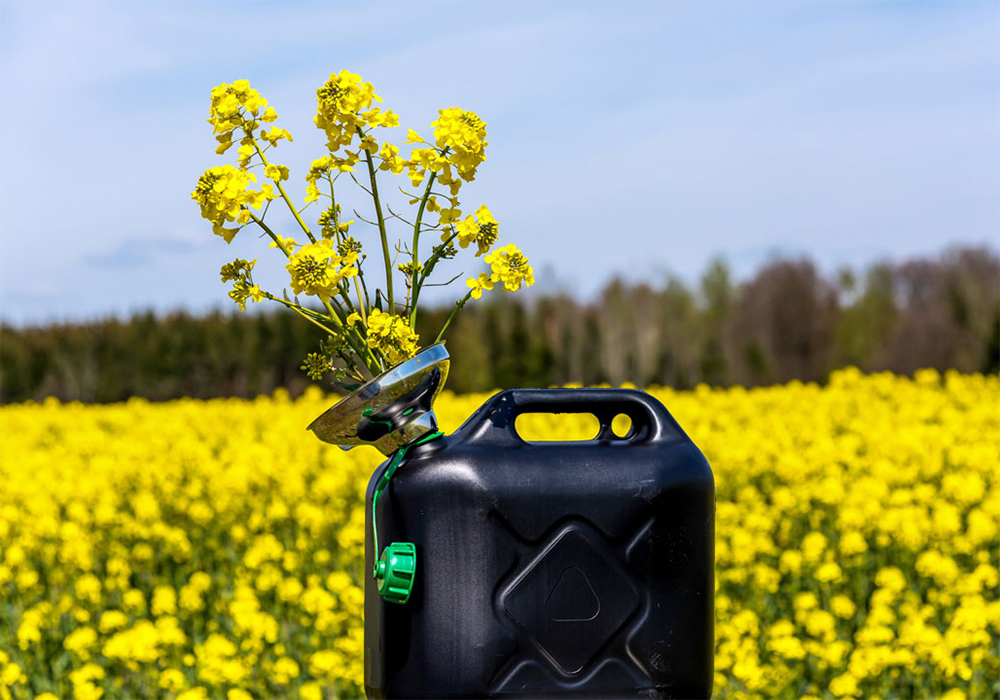
Corteva, Bunge and Chevron U.S.A., a subsidiary of Chevron Corp., announced March 14 a collaboration to introduce proprietary winter canola hybrids that produce oil with a lower carbon profile for the renewable fuels market. The companies plan to introduce the hybrids in the southern United States, where they can be used in a double-cropping system following soybeans or cotton. “Adding winter canola to a rotation provides a cover crop that can enhance soil health by holding more nutrients, water and carbon in the soil,” noted Biobased-Diesel.com. “The race for ingredients to make green diesel and sustainable jet fuel is bringing Canada’s namesake crop into the American Deep South,” wrote Kim Chipman of Bloomberg.
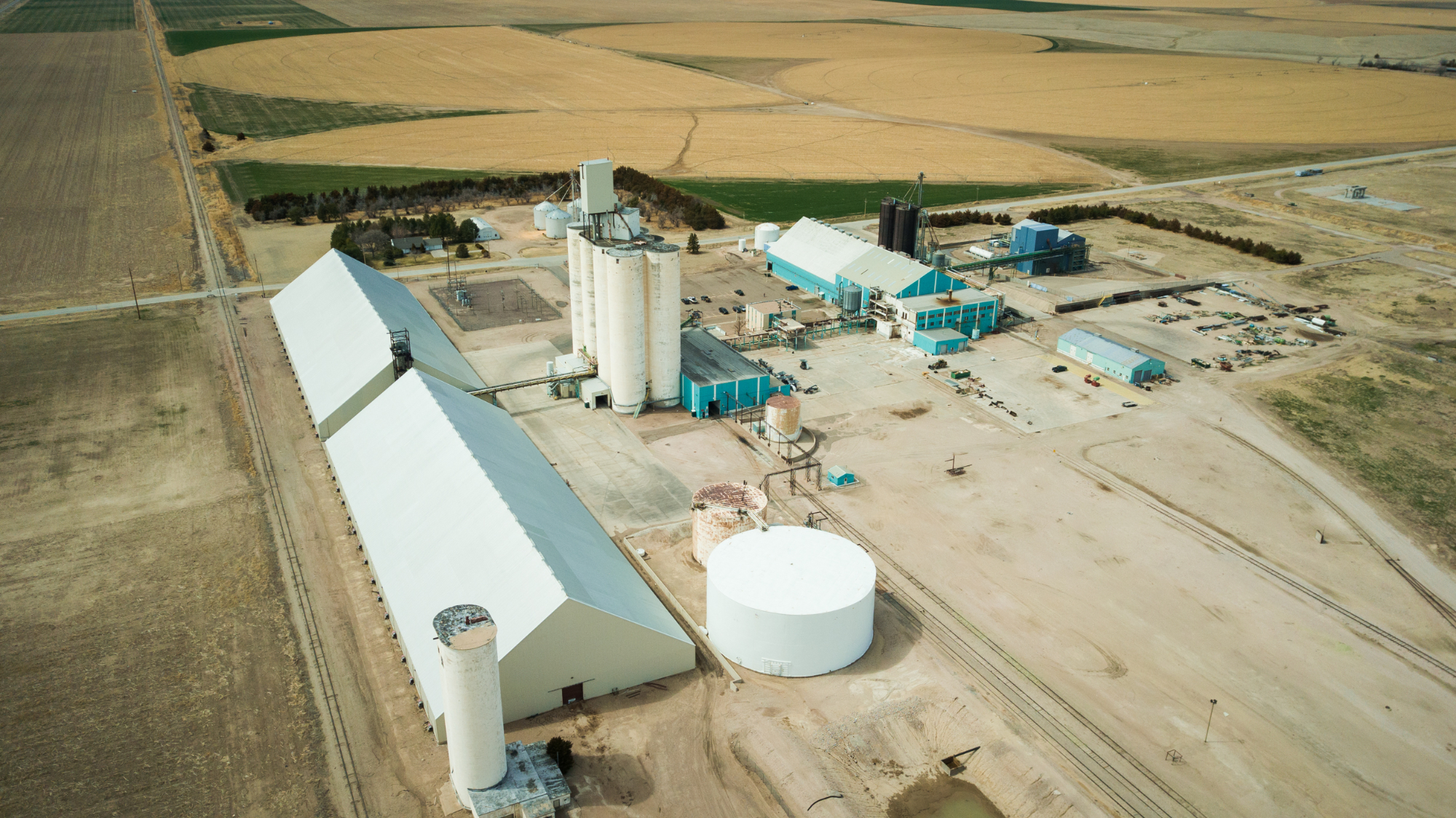 Scoular of Omaha, Neb. announced March 14 that it will retrofit a former canola and sunflower crush plant near Goodland in northwest Kansas that it purchased in 2021 to process canola and soybeans for the renewable fuels market. “Because of its high-oil content, canola is highly valued in the renewable fuels sector, particularly for use in the growing renewable diesel and sustainable aviation fuel markets,” the company stated in a news release. “Those markets will grow to over 5 billion gallons by 2025.” The recommissioned plant will process 11 million bushels of oilseeds a year. It is expected to be operational by fall 2024. “Scoular’s decision to invest in the crush facility in Goodland will increase marketing opportunities for farmers and contribute to the economic prosperity of northwest Kansas,” added Senator Jerry Moran (R-KS) in his e-newsletter Kansas Common Sense on March 20. “The Goodland oilseed processing plant is an important juncture for farming in western Kansas and food and fuel production for the nation.” Scoular of Omaha, Neb. announced March 14 that it will retrofit a former canola and sunflower crush plant near Goodland in northwest Kansas that it purchased in 2021 to process canola and soybeans for the renewable fuels market. “Because of its high-oil content, canola is highly valued in the renewable fuels sector, particularly for use in the growing renewable diesel and sustainable aviation fuel markets,” the company stated in a news release. “Those markets will grow to over 5 billion gallons by 2025.” The recommissioned plant will process 11 million bushels of oilseeds a year. It is expected to be operational by fall 2024. “Scoular’s decision to invest in the crush facility in Goodland will increase marketing opportunities for farmers and contribute to the economic prosperity of northwest Kansas,” added Senator Jerry Moran (R-KS) in his e-newsletter Kansas Common Sense on March 20. “The Goodland oilseed processing plant is an important juncture for farming in western Kansas and food and fuel production for the nation.”
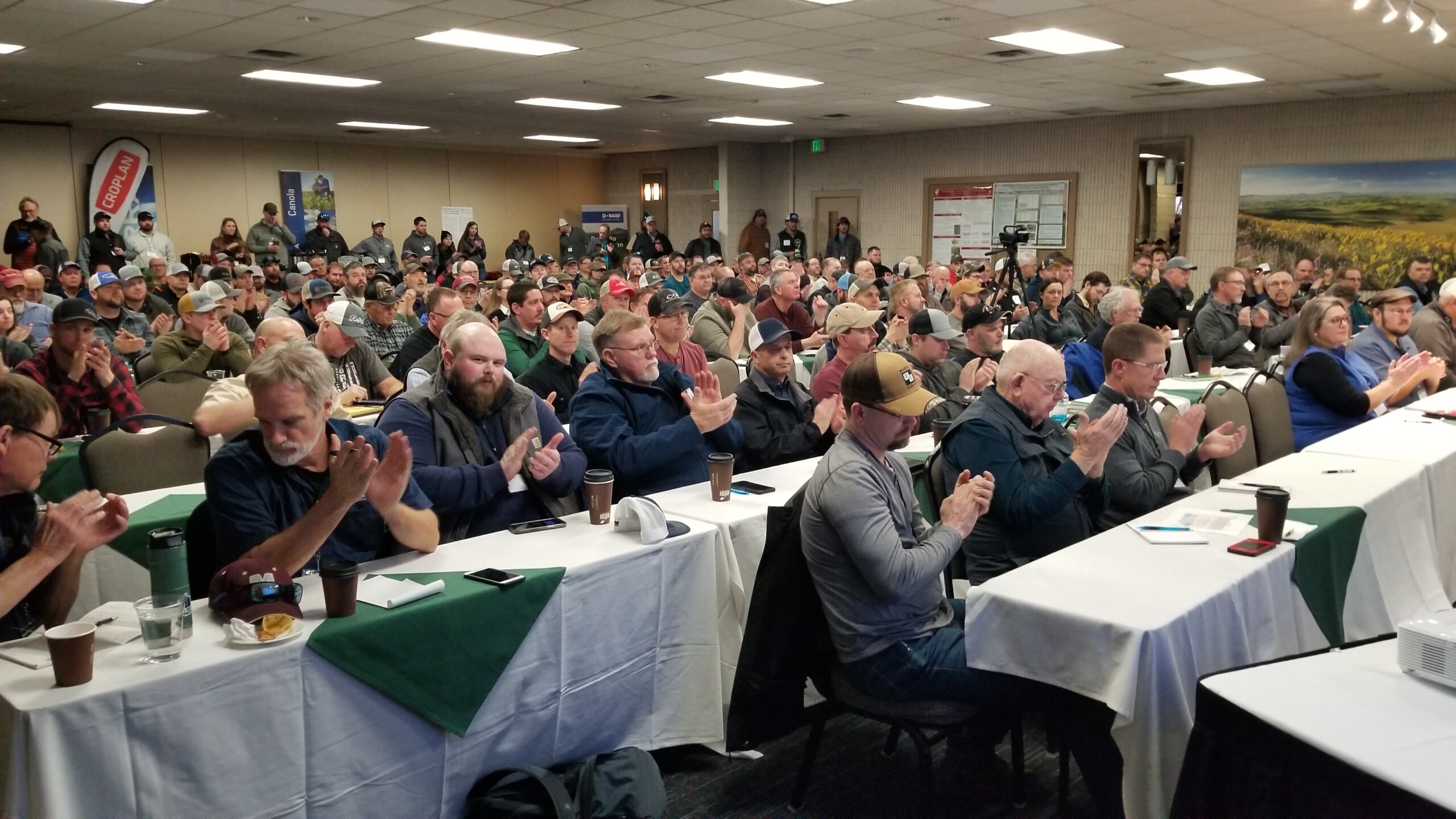 The Pacific Northwest Canola Association (PNWCA) held a workshop Jan. 25 in Moscow, Idaho with record attendance of 215. Its theme was “Getting Back to Basics,” featuring panels of new and experienced growers. Topics included soil and plant nutrition, weed control and herbicide management, insurance, marketing, stand establishment, diseases and fungicide strategies, harvesting and storage, and insect pests and beneficials. The workshop also featured demonstrations by faculty from the University of Idaho and Washington State University. It was preceded by the PNWCA’s annual membership and board of directors meeting Jan. 24, which welcomed new board member Casey Nickol of Shelby, Mont., and elected Brendan Sherry of Walla Walla, Wash. as vice president. Other board members include President Dale Flikkema of Bozeman, Mont.; 2nd VP Heidi Kopf of Pullman, Wash.; Secretary-Treasurer Matt Renfrow of BASF and Daniel Stenbakken of Viterra. This year to date, the PNWCA has gained seven new industry members, two new agency members, and 25 new producer members. The Pacific Northwest Canola Association (PNWCA) held a workshop Jan. 25 in Moscow, Idaho with record attendance of 215. Its theme was “Getting Back to Basics,” featuring panels of new and experienced growers. Topics included soil and plant nutrition, weed control and herbicide management, insurance, marketing, stand establishment, diseases and fungicide strategies, harvesting and storage, and insect pests and beneficials. The workshop also featured demonstrations by faculty from the University of Idaho and Washington State University. It was preceded by the PNWCA’s annual membership and board of directors meeting Jan. 24, which welcomed new board member Casey Nickol of Shelby, Mont., and elected Brendan Sherry of Walla Walla, Wash. as vice president. Other board members include President Dale Flikkema of Bozeman, Mont.; 2nd VP Heidi Kopf of Pullman, Wash.; Secretary-Treasurer Matt Renfrow of BASF and Daniel Stenbakken of Viterra. This year to date, the PNWCA has gained seven new industry members, two new agency members, and 25 new producer members.
North Dakota State University and the Northern Canola Growers Association held a “Getting it Right in Canola” production meeting virtually on March 9. Speakers presented information on all aspects of canola production. Over 100 attendees heard details on plant establishment, fertility, weed, disease and insect control as well as about developments in the biofuel industry and commodity markets. Videos of the presentations and other resources are available online.
About the USCA
 The USCA held its annual spring board and membership meeting in Washington, D.C., in mid-March. Speakers addressed the 2023 Farm Bill, other federal policies impacting canola, renewable diesel and more. USCA members also met with Congressional staff, including Senators Kevin Cramer (R-ND), John Hoeven (R-ND) and Jerry Moran (R-KS), about legislative priorities. These meetings were followed by the USCA’s 17th Canola on Capitol Hill reception. “When the U.S. Canola Association held a reception on the top floor of the Hart Senate Office Building on Wednesday evening, it displayed a theme of ‘Powering Up With Canola,’” reported Jerry Hagstrom of The Hagstrom Report. “That theme for the Canola on Capitol Hill reception reflected the industry’s interest in the use of canola in renewable fuels, but at the reception the focus was on a more traditional use: All the appetizers … were cooked in canola oil.” Photos of USCA leaders and foods served were included. The USCA thanks reception sponsors ADM, BASF, Bayer CropScience, Bunge, Cargill, CHS, Corteva, NuSeed, Rubisco Seeds and Spectrum Crop Development. The USCA held its annual spring board and membership meeting in Washington, D.C., in mid-March. Speakers addressed the 2023 Farm Bill, other federal policies impacting canola, renewable diesel and more. USCA members also met with Congressional staff, including Senators Kevin Cramer (R-ND), John Hoeven (R-ND) and Jerry Moran (R-KS), about legislative priorities. These meetings were followed by the USCA’s 17th Canola on Capitol Hill reception. “When the U.S. Canola Association held a reception on the top floor of the Hart Senate Office Building on Wednesday evening, it displayed a theme of ‘Powering Up With Canola,’” reported Jerry Hagstrom of The Hagstrom Report. “That theme for the Canola on Capitol Hill reception reflected the industry’s interest in the use of canola in renewable fuels, but at the reception the focus was on a more traditional use: All the appetizers … were cooked in canola oil.” Photos of USCA leaders and foods served were included. The USCA thanks reception sponsors ADM, BASF, Bayer CropScience, Bunge, Cargill, CHS, Corteva, NuSeed, Rubisco Seeds and Spectrum Crop Development.
Want to promote your products or services to canola producers and industry members? Visit our advertising pages to find specs, deadlines and rates to advertise in this monthly e-newsletter or on UScanola.com.
Get social with us on Instagram, LinkedIn, Facebook, Twitter and YouTube.
|
 On March 15, Senator Jerry Moran (R-KS) met with members of the U.S. Canola Association (USCA) about their priorities for the upcoming farm bill that will benefit canola growers in Kansas. “Michael Stamm, a canola breeder and researcher at Kansas State University talked about the importance of research, especially research geared towards winter canola,” wrote Sen. Moran in his March 20 Kansas Common Sense e-newsletter. “We discussed the growing demand for biofuels and the role canola plays in filling that demand. We also spoke about the recommissioning of the crush plant in Goodland which will create new jobs and provide new opportunities for canola growers in the area.”
On March 15, Senator Jerry Moran (R-KS) met with members of the U.S. Canola Association (USCA) about their priorities for the upcoming farm bill that will benefit canola growers in Kansas. “Michael Stamm, a canola breeder and researcher at Kansas State University talked about the importance of research, especially research geared towards winter canola,” wrote Sen. Moran in his March 20 Kansas Common Sense e-newsletter. “We discussed the growing demand for biofuels and the role canola plays in filling that demand. We also spoke about the recommissioning of the crush plant in Goodland which will create new jobs and provide new opportunities for canola growers in the area.” The USCA submitted to Congressional offices its annual federal appropriations requests for the Supplemental & Alternative Crops program and Sclerotinia research initiative, which directly benefit canola. In addition, the USCA supported joint efforts to advocate for adequate resources for the Environmental Protection Agency’s Office of Pesticide Programs to carry out pesticide registration and Endangered Species Act-related activities.
The USCA submitted to Congressional offices its annual federal appropriations requests for the Supplemental & Alternative Crops program and Sclerotinia research initiative, which directly benefit canola. In addition, the USCA supported joint efforts to advocate for adequate resources for the Environmental Protection Agency’s Office of Pesticide Programs to carry out pesticide registration and Endangered Species Act-related activities. The USCA signed a letter to President Joe Biden in response to Mexico’s treatment of agricultural biotechnology, emphasizing that the U.S.-Mexico relationship must be underpinned by science-based, functioning laws and regulatory bodies. Despite multiple engagements by the U.S. government to resolve this situation through negotiations, Mexico recently released a new decree that wrongly calls into question the safety of biotech products for human consumption by creating a non-science-based distinction of corn used for food versus feed and industrial uses.
The USCA signed a letter to President Joe Biden in response to Mexico’s treatment of agricultural biotechnology, emphasizing that the U.S.-Mexico relationship must be underpinned by science-based, functioning laws and regulatory bodies. Despite multiple engagements by the U.S. government to resolve this situation through negotiations, Mexico recently released a new decree that wrongly calls into question the safety of biotech products for human consumption by creating a non-science-based distinction of corn used for food versus feed and industrial uses.
 Canola planting restrictions in
Canola planting restrictions in  What do we know about canola flower midge? Dr. Meghan Vankosky, entomologist with Agriculture and Agri-food Canada says in
What do we know about canola flower midge? Dr. Meghan Vankosky, entomologist with Agriculture and Agri-food Canada says in 
 A collaboration between Alberta Canola, SaskCanola, the Manitoba Canola Growers Association and Western Grains Research Foundation will enable more than $1.7 million in funding for five new projects under the Canola Agronomic Research Program (CARP) in 2023. The projects will address developing and evaluating disease resistance, abiotic stress resilience, and integrated pest management. The CARP is administered by the
A collaboration between Alberta Canola, SaskCanola, the Manitoba Canola Growers Association and Western Grains Research Foundation will enable more than $1.7 million in funding for five new projects under the Canola Agronomic Research Program (CARP) in 2023. The projects will address developing and evaluating disease resistance, abiotic stress resilience, and integrated pest management. The CARP is administered by the 
 Scoular
Scoular The
The  The USCA held its annual spring board and membership meeting in Washington, D.C., in mid-March. Speakers addressed the 2023 Farm Bill, other federal policies impacting canola, renewable diesel and more. USCA members also met with Congressional staff, including Senators Kevin Cramer (R-ND), John Hoeven (R-ND) and Jerry Moran (R-KS), about legislative priorities. These meetings were followed by the USCA’s 17
The USCA held its annual spring board and membership meeting in Washington, D.C., in mid-March. Speakers addressed the 2023 Farm Bill, other federal policies impacting canola, renewable diesel and more. USCA members also met with Congressional staff, including Senators Kevin Cramer (R-ND), John Hoeven (R-ND) and Jerry Moran (R-KS), about legislative priorities. These meetings were followed by the USCA’s 17